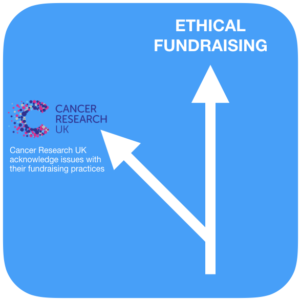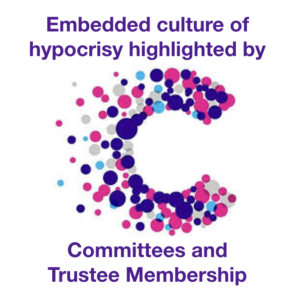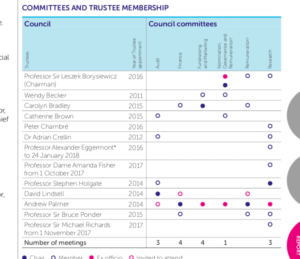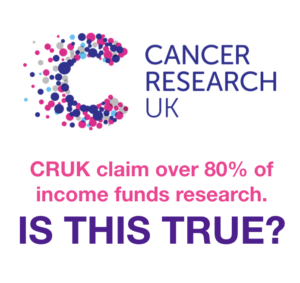 Here at the Race 4 Truth we have highlighted a number of concerns over the way Cancer Research UK deliberately misleads supporters, misrepresents facts, displays serious hypocrisy, and potentially supports fraud. We have gone as far as to question the culture of the organisation and its poor ethics and low integrity.
Here at the Race 4 Truth we have highlighted a number of concerns over the way Cancer Research UK deliberately misleads supporters, misrepresents facts, displays serious hypocrisy, and potentially supports fraud. We have gone as far as to question the culture of the organisation and its poor ethics and low integrity.
But, are all of the these issues something the organisation is not only fully aware of but is deliberate, planned policy?
We have been examining Cancer Research UK’s 2017-18 Annual Report and, in among many other concerns it raises, we have found a rather damning statement on page 42.
At the top of the page, Cancer Research UK cite a reputation risk; “an issue related to our fundraising practices.”
Some might find this a very strange thing to consider a risk to reputation if those fundraising practices were more transparent, honest, and ethical. Of course, conversely, if CRUK are aware that many of their policies sail very close to the wind raising questions of morals, ethics and integrity, then there is a very real risk to reputation.
Given everything we have discovered about how this organisation operates, the incredible thing is that there is still any degree of reputation intact. Yet they continue to pull the wool over the eyes of the British public and get away with it.
We find ourselves once again questioning the culture within Cancer Research UK, the organisation’s integrity, and its ethical and moral compass. For this single line buried deep in their annual report suggests that the many issues Race 4 Truth have already highlighted are embedded, deliberate policy; policy that the senior management know is immoral and unethical but which are deliberate and which they encourage and employ regardless.
In the Race 4 Truth, Cancer Research UK are lagging behind.

 Quite reasonably, when most people enter the Race for Life they assume that their entry fee is helping fund research into cancer. After all Cancer Research UK frequently repeat the mantra “this is beating cancer” when promoting the events. But the truth is very different.
Quite reasonably, when most people enter the Race for Life they assume that their entry fee is helping fund research into cancer. After all Cancer Research UK frequently repeat the mantra “this is beating cancer” when promoting the events. But the truth is very different. The Race 4 Truth has now been up and running for three months and the silence from Cancer Research UK in response has been deafening. But that silence speaks volumes.
The Race 4 Truth has now been up and running for three months and the silence from Cancer Research UK in response has been deafening. But that silence speaks volumes.

 Cancer Research UK’s 2017-18 Annual Report claims “more than 80p from every £1” goes to funding research. However, a closer look reveals the figure is not an accurate one and omits certain income streams to paint a better picture than the reality.
Cancer Research UK’s 2017-18 Annual Report claims “more than 80p from every £1” goes to funding research. However, a closer look reveals the figure is not an accurate one and omits certain income streams to paint a better picture than the reality. Here at the Race 4 Truth we have highlighted a number of concerns over the way Cancer Research UK deliberately misleads supporters, misrepresents facts, displays serious hypocrisy, and potentially supports fraud. We have gone as far as to question the culture of the organisation and its poor ethics and low integrity.
Here at the Race 4 Truth we have highlighted a number of concerns over the way Cancer Research UK deliberately misleads supporters, misrepresents facts, displays serious hypocrisy, and potentially supports fraud. We have gone as far as to question the culture of the organisation and its poor ethics and low integrity. There is a subtle but important difference between funding Cancer Research UK and funding research into cancer.
There is a subtle but important difference between funding Cancer Research UK and funding research into cancer.